Pioneering Land Reclamation at the UofA: A Conversation with Dr. M. Anne Naeth
Posted on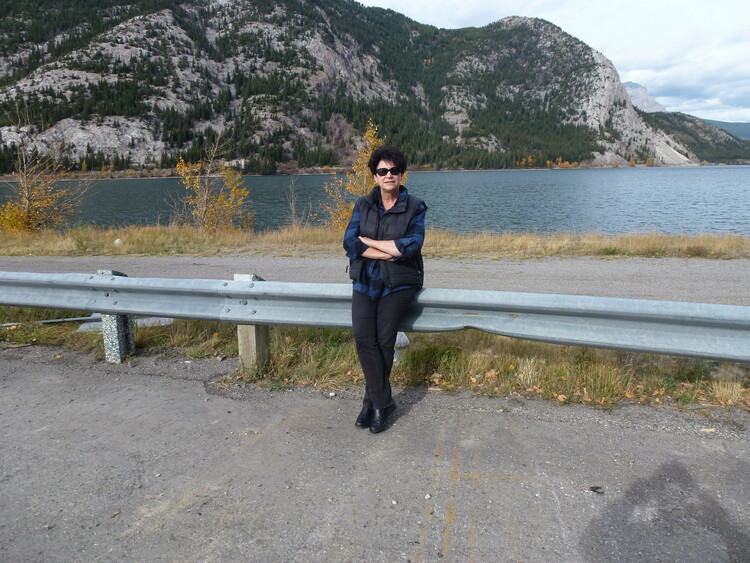
Dr. M. Anne Naeth near Exshaw limestone quarry reclamation site
When it comes to academia and professional exploration, the path taken is more often a winding one than a straight shot, likely filled with unexpected turns and surprising discoveries. Such is the case for Dr. Anne Naeth—Director of Future Energy Systems and the Land Reclamation International Graduate School—whose journey led her from small-town Saskatchewan to working in land reclamation at the University of Alberta.
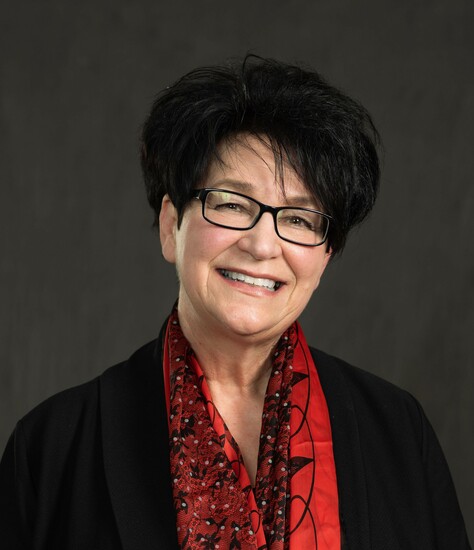
Anne’s academic voyage began with a focus on the biological sciences, majoring in biology with minors in psychology and English at the University of Saskatchewan. Though initially drawn to the pre-medicine track, she soon realized that her true calling lay elsewhere. It was her advisor’s insightful recommendation to try out botany that sparked the shift in her academic trajectory.
“The best advice I got during my undergraduate degree was to take a class that I felt passionate about. So I enrolled in a botany class and loved every minute of it,” Anne recounts. “Growing up on a farm, I saw firsthand the different ways we use land and the sometimes very harsh consequences. That class inspired me to work with the land in some way.”
She transferred to the University of Alberta to finish her degree and work as a researcher at the Alberta Environmental Centre. As she explored Alberta’s plants and ecosystems, Anne tapped into her farming roots and a passion for understanding and restoring damaged landscapes. This experience solidified her commitment to addressing the environmental impacts of human activities, particularly those resulting from the mining, oil, and gas sectors.
Reclaiming the Land
“Land reclamation doesn’t sacrifice development for sustainability,” Anne clarifies. “We know we have to disturb the land to build oil fields, solar farms, and continue urban development. So how can we implement strategies allowing us to do what we need for our lifestyles with less destruction and more consideration for the environment?”
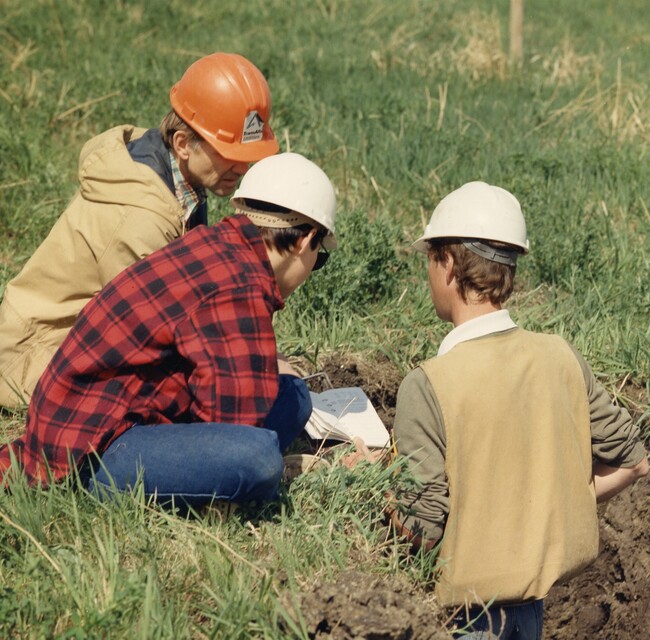
Driven to enrich her education and expertise, Anne returned to the University of Alberta to pursue a graduate degree in land reclamation—a program that, to her disappointment, did not exist at the time. She took matters into her own hands and instead pursued dual master’s degrees in plant science and soil science at the University of Alberta.
“The University told me a land reclamation degree wasn’t an option because it didn’t exist anywhere,” Anne says. “But they let me complete a double master's in the relevant disciplines of soils and plant sciences, and I built my own curriculum that eventually led me to my chosen field. When I graduated, the University of Alberta allowed me a special designation of land reclamation on my degree, and I became the first person to officially graduate with a land reclamation degree from the University of Alberta.”
Anne went on to earn her doctorate at the University of Alberta, focusing on soil-plant-water relationships with a land reclamation focus. She acquired the position of Research Associate, then later an academic position. She continued to build the land reclamation program and eventually established the Land Reclamation International Graduate School within the Faculty of Agricultural, Life and Environmental Sciences. The program was established with the first NSERC CREATE program at the University of Alberta and was the first school of its kind in the world. Now commonly known as LRIGS, this program continues to train students from around the world to use interdisciplinary approaches to reclaim disturbed land and water. It was this interdisciplinary perspective that naturally tied LRIGS, and Anne, to the Future Energy Systems research program. As Director, she has prioritized interdisciplinary approaches to administration, and her own research continues to depend on innovative thinking.
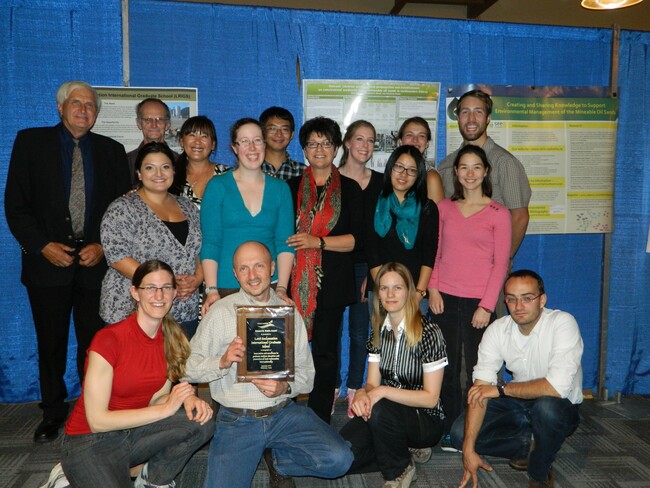
A ground connection
Inspiration is never short in Anne’s world; there’s always a new problem to solve when it comes to environmental sciences. Her work today focuses on land reclamation, mainly developing innovative strategies for revegetation, soil building, soil remediation, and ecosystem restoration, with an emphasis on creating resilient landscapes that can withstand environmental and operational challenges.
One such strategy is bioremediation—that is, supporting microorganisms, such as bacteria and fungi, that remove contaminants from soils. By implementing knowledge, research, and technology, bioremediation speeds up a natural process and supports an ecosystem’s resilience.
Notably, Anne led the development of a new soil classification for Canada called Anthroposols—the Greek term for human-made soils. With large-scale disturbances, such as mining, there is insufficient soil for reclamation, so it must be to improve overall soil and environment quality. The road to making Anthroposols a Soil Order in the Canadian System of Soil Classification has been long, taking decades of trial and error in the field and the efforts of many across the country.
Though Anne’s background is foundationally in soil and plant sciences, she understands that successful land reclamation is dependent on interdisciplinary collaboration. Hydrology, for example, plays a critical role in supporting resilient ecosystems. Plants need water for survival, and it’s important to consider the type of soil that will best support plant growth in different ecosystems. Take house plants as an example: you wouldn’t use the same type of soil for your tropical plants as you would for your cacti because they have different needs.
And the interdisciplinary aspect of Anne’s work extends far beyond the realm of science; she recognizes the importance of collaboration and notes the complex socio-economic and policy challenges associated with land reclamation.
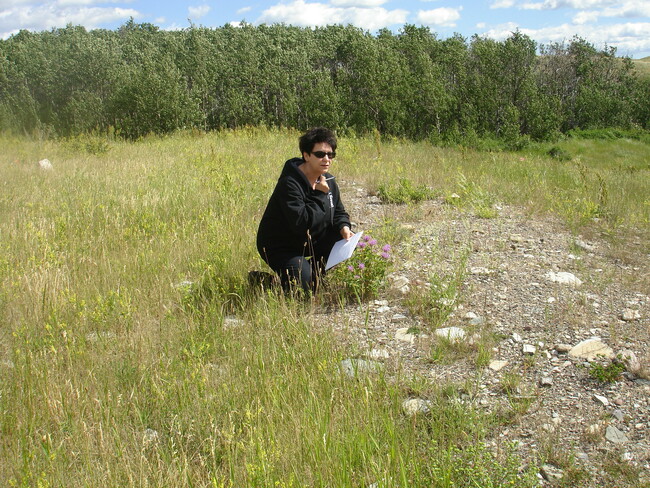
“It’s exciting that we get to study so many things—microorganisms, flora, fauna, insects, and even how policy decisions and regulations factor in. But our focus is on reclaiming the environment, and it’ll take efforts from more than land scientists. We already know a lot about dealing with contaminants, it’s more about finding the time and money to fix the land. We have to sell the importance of land reclamation and get people excited about it again.”
Our need for land reclamation: past, present & future
There are other barriers to progress in the discipline of land reclamation. Anne points to a lack of interest among young people in pursuing careers in the field, and thoughts that land reclamation is only intended to enable extractive industries. She advocates for greater awareness and education, emphasizing that land reclamation isn’t about any one sector, but about addressing the reality that humans change the landscapes upon which they live in myriad ways––and always will.
“There’s always going to be a need for land reclamation,” she asserts. “To restore what’s been affected by human activity, no matter if the causes were urban, industrial, warfare, or even the results of natural disasters or changing weather patterns. It plays too crucial a role in shaping a sustainable future for generations to come.”
She adds: “People often think that land reclamation is a newer science, which is partly true. However, humans have been practicing land reclamation since the times of hunter-gatherer societies and the first hydrologically-focused civilizations. We learned how to change the land and waterways to support irrigation for agriculture, sanitation, and our other uses, and we did it in ways that didn’t jeopardize environments of the future.”
In Anne’s eyes, the key to inspiring change lies in fostering a deep understanding of the importance of land reclamation and empowering individuals to become advocates for the environment. As she continues her work at the forefront of an evolving field, Anne remains driven by a sense of purpose and a commitment to leaving a positive legacy for the planet and its inhabitants.
Further reading:
Biophysical Impacts of Energy Systems and Indicators of Reclamation Success.
Development of Novel Biochar Materials for Land and Water Reclamation.
Potential of Biological Materials for Coal Mine Reclamation.